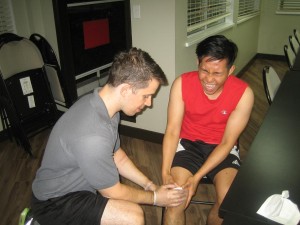Tight tendons can affect movement which results to pain, discomfort and injury. It is important to note that every muscle in the body is linked to bone by the tendons.
The tendons are continuous with the muscles and the connective tissue that borders a bone creates a strong link that enables bodily movements.
Repeated use
Remember that repetitive use or overuse occurs if the individual engages in the same activities daily. If an individual engages in the same motions repeatedly, it stresses the joints and neighboring tissues which results to shortened and tight tendons.

Postural irregularities
Some alterations in the posture such as a rounded upper back are quite evident and can result to more issues. Poor posture over an extended time frame can lead to shortened, tight tendons and possibly altered patterns during movement as well as pain.
Previous injuries
If the individual has an injured tendon, the body compensates by altering the movement patterns during healing to avoid pain as well as prevent further trauma. Take note that these compensations can end up as habits and might even continue even after healing has occurred.
The formation of scar tissue can also occur during healing which tugs on the damaged tissue together to shorten it. This cause even more discomfort and tightness.
Poor stretching
When exercising, the muscles and tendons repeatedly contract and relax. If the individual was not able to properly stretch before and after exercise, the tendons remain short and less flexible which results to discomfort and pain as well as increasing the risk for injury.
Aging
As part of the aging process, tight tendons are less flexible and susceptible to injury. It is vital to maintain flexibility of the tendons throughout life.
Medical conditions
Some medical ailments can affect the tendons and their flexibility such as arthritis, infection, thyroid disease, gout and diabetes. This results to discomfort and inflammation in the entire joint complex.
